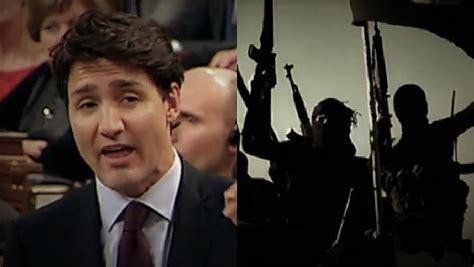
Government should target Canadian ISIS fighters
The government should be more frank about its role in targeting Canadians fighting with overseas terrorist groups, the country’s former top military lawyer told a national security podcast.
“I think as a general rule it would be better if our government could find ways to have that discussion,” Blaise Cathcart, who retired last year as Judge Advocate General, told A Podcast Called Intrepid.
Since Global News revealed in May that the military coalition that Canada belongs to in Syria and Iraq has targeted several Canadian citizens in airstrikes, the Liberals have had little to say on the issue.
But in the interview with podcast hosts Prof. Craig Forcese and Prof. Stephanie Carvin, Cathcart shed some light on Canada’s approach and countered those who argued it was illegal for the government to target its own citizens.
He said that during an armed conflict, the military could legally kill enemy combatants.
“Once you’re in that armed conflict paradigm, terms like targeted killing don’t exist,” he said. “You’re allowed to attack, capture, destroy valid military objectives. They can be people. They can be objects.”
During coalition military operations, targeting lists were produced and teams that included Canadian military lawyers analysed potential targets to ensure each strike was legal and worthwhile, he said.
Cathcart came out in support of more government transparency on the issue, even though Canada’s adversaries might benefit from more public disclosure of military decision-making.
“There’s a very real challenge because … a lot of those who are enemies, or planning to do harm to us, would love to know in more detail how we do business because they will use that to their advantage,” he said.
“So it’s a difficult balance.”
“I would still say there’s room. There’s room for governments today, as the U.K. has demonstrated — whether it’s this or international humanitarian intervention topics — to put some things out there on the record that I think, in many ways, most Canadians would feel pretty confident that decision-makers are thinking about these things.”
Global News has reported that a secret military briefing note dating back to 2015 laid out the legal justification for airstrikes targeting Canadian foreign terrorist fighters in Iraq and Syria. Three Canadians were targeted in just the first year of the coalition mission, it said.
The document went on to say that “while the nationality of targeted individuals is – in the context of the Law of Armed Conflict – not an issue, domestic Canadian policy, political, and legal concerns may emerge.”
Those legal and policy questions likely include how the Charter of Rights and Freedoms would interpret the participation of the government in the targeted killings of Canadians in combat zones.
Targeted killings became a political issue in Ottawa last fall after the United Kingdom and United States said they preferred to kill foreign ISIS fighters overseas than have them return home.
The Liberal government, however, had a different message. Public Safety Minister Ralph Goodale told the CBC that “Canada does not engage in death squads.” Defence Minister Harjit Sajjan has said only that Canada follows the law of armed conflict.
Leah West, a lawyer with the National Security Litigation Group at the Department of Justice, told the podcast hosts that targeting Canadians because they were combatants wasn’t the same as targeting combatants because they were Canadian.
“The difference is, in some of this conversation about targeted killing, is the difference between targeting people who are bad guys and Canadian, and targeting people because they’re Canadian and bad guys,” said West, who is also the Anti-Terrorism Research Fellow at the University of Ottawa.
“We’ve seen some of the political dialogue about targeting people before they come back to Canada, as if that’s the reason to target them, because they might come back,” she said.
“Well, that’s not the appropriate response under the law of armed conflict, because they’re Canadian and might come back. The reason to target them is because they’re … a combatant on the battle space.”
Source: globalnews





